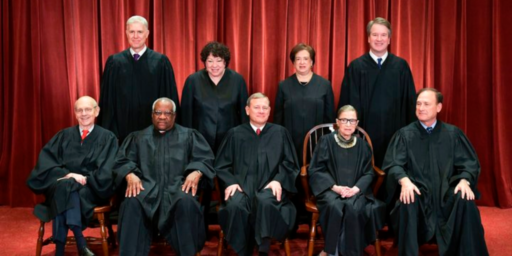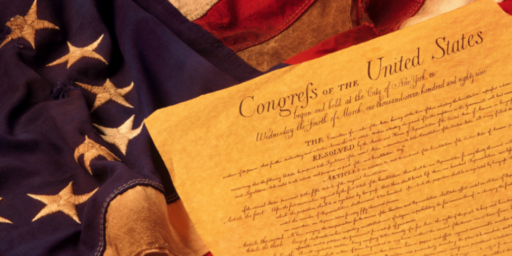AMERICAN EMPIRE
Niall Ferguson contends that the US is indeed an imperial power and that this is a very good thing:
Many critics have seized upon this “Bush doctrine” as a dangerous, even revolutionary departure from post-1945 U.S. practice. I am not so sure. For one thing, it is eminently desirable that free markets, the rule of law and democracy should be introduced in countries currently languishing under rogue regimes. For another, regime changes of the sort we have seen in Afghanistan and Iraq are an indispensable element of the war against terrorism. Terrorists are sustained by dictatorships and flourish in conditions of anarchy. The terrorist threat will never be contained if the U.S. does not eradicate breeding grounds. And a strategy of global containment is not really a major departure in policy.
The radical aspect of the doctrine is not the theory but the practice. When Mr. Bush says he is prepared to fight terror in “every corner of the world,” he really can. And he really does. If this isn’t imperial power, I don’t know what is. But here’s the paradox. Vast though America’s military power has become, the idea that the U.S. has become an authentic empire remains entirely foreign to the majority of Americans, who uncritically accept what has long been the official line: that the U.S. just doesn’t “do empire.”
Indeed, Ferguson’s main qualm is that the US isn’t imperial enough:
Unfortunately, this myopia is one of the things that makes the American empire very different from–and, I believe, less effective than–the last great Anglophone empire, the British one. Americans have no qualms about sending their troops to fight in faraway countries. But they expect wars to be short and the casualty list to be even shorter. Since the war in Iraq officially ended, 40 U.S. soldiers have lost their lives, some as a result of terrorist attacks. Already there is a queasiness about this. When can our boys come home?
The realistic answer is: not for at least five years, the minimum duration of occupation that will stabilize Iraq. And if the British experience of governing Iraq after World War I is anything to go by, 40 years might be more realistic. Alas, nobody in Washington is willing to contemplate a military presence on that time scale. The U.S. may be a “hyperpower,” the most militarily powerful empire in history. But it is an empire in denial, a colossus with an attention deficiency disorder. That is potentially very dangerous.
An interesting argument but one that plays with definitions. The US has been, at least since the end of the Cold War, willing to impose its will on rogue regimes. This tendency has been strengthened since 9-11, with many critics of the interventionism of the Clinton Administration (this pundit included) now reluctantly persuaded that sticking our nose into other people’s business is more necessary than we previously believed. Still, the fact that we aren’t occupying them for the purpose of extracting wealth seems to indicate that the term “empire” is too simplistic a description.






One of the things I hate about this argument is that 2/3rds of the time it becomes a meta-argument, while the participants don’t realize it. So they stop talking, and they just start arguing.
For starters, you must mutually agree on your definition of “Empire.” If you have a common basis of agreement ont his, then you can go forward. If you don’t, you’ll run around in circles forever.
Then, you have to agree on whether or not Empires are morally good, bad, or neutral. Also, are they an inevitability of the human political process?
Most people don’t go deep enough to have constructive arguments about this.
Here’s a URL (http://slate.msn.com/id/2075261/) to an essay by Christopher Hitchens on the meaning of American “Empire.” He thinks we may have to come up with another term.
Like Dean, I think the terms are critical. When I was taking my doctoral classes, there were endless debates about empire, formal vs. informal empire, and probably a dozen others.
Just to make sense of history, I decided that “empire” has to involve physical conquest of territory with an intent to keep control of it. Otherwise, the term becomes meaningless, and almost any foreign policy move made at the expense of any other nation can be defined as imperialism of some kind–political, economic, cultural, and so on.
So I don’t see the war against terror as empire-building. It’s aggressive, it involves temporary control of territory, it’s interventionist, but it’s not imperial.
Kevin and Dean, I am with you %100. And Hitchens, a fair historian himself, is also in the right. Several months ago, when Fergusson first appeared on the mainstream media radar screen, I was thrilled. A first rate scholar willing to reexamine old shibboleths about empire and history. Now I’m sick to death of him (how fickle is the public) and what’s more think he’s barking up the wrong tree. He is increasingly calling for a new, improved British Empire under the U.S. flag. Forty years in Iraq? God forbid. Where is the American Clive? Rhodes? Raja Brooke of Sarawak? Americans are not interested in ruling other peoples, and other peoples are extremely touchy (do I really need to say this?) about the idea of anyone telling them what to do. This renders all “empire building” impossible, ergo Fergusson is either a fool or a damn fine self-promoter with a single “controversial” idea to sell. The latter, surely, is true. Fergusson the capitalist has defeated Fergusson the honest historian.
—